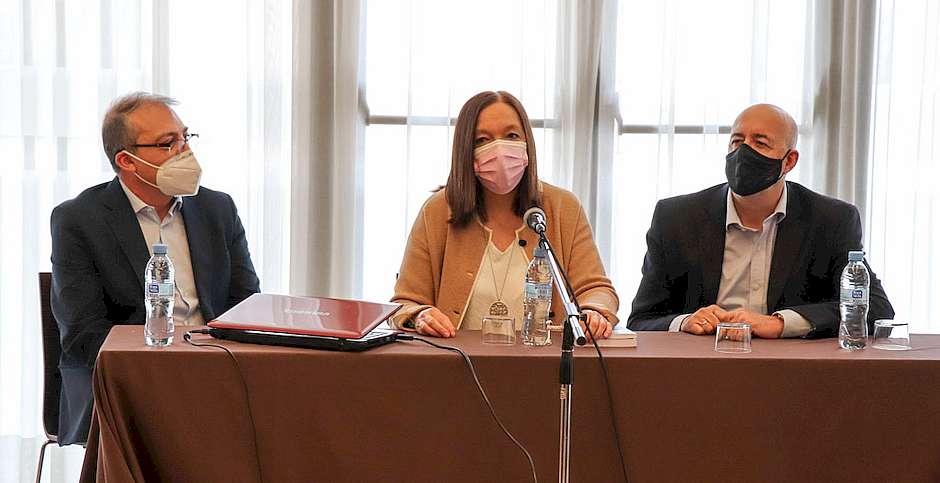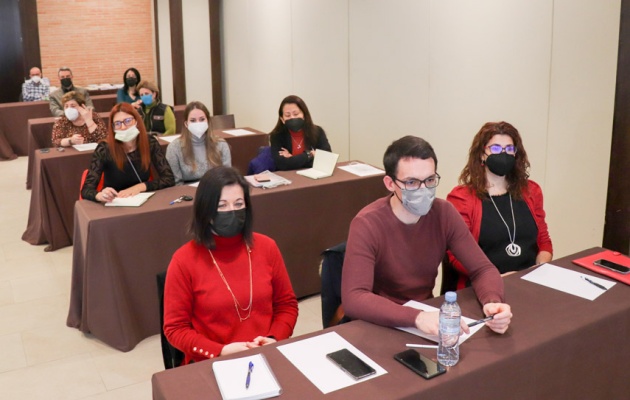Evangelical Forum of Law: Indispensable freedom, acceptable offense, condemnable hatred
The speakers at the evangelical gathering stressed that criticism and offense should not be equated to hate speech, and that freedom of expression should prevail in case of doubt.
Protestante Digital, Actualidad Evangélica · ALCÁZAR DE SAN JUAN · 10 FEBRUARY 2022 · 12:51 CET

The 9th national meeting of the Spanish Evangelical Forum of Law held from 4 to 6 February in the city of Alcázar de San Juan focused on the theme “Freedom of expression and conscience versus hate crimes”.
Around 40 people from all over the country took part in this meeting to address this current hot issue in Spain.
José Moreno, pastor of the Evangelical Christian church of Alcázar de San Juan and host of the event, underlined that he was thankful for the interest the topic had raised among Christian barristers.
The President of the Forum, Eliseo Gómez-Lor, explained that this gathering has been held annually since 2013 to address issues of interest to citizens by jurists of evangelical Christian faith, both lawyers and law students or people involved in the world of jurisdiction.
For Gómez-Lor, this year's theme is “a highly topical issue. The line between what can be said and what cannot be said is very thin. We are talking about a new inquisition that tells us where the limit of freedom of expression lies”.
Rosa Melchor, Mayoress of the city, inaugurated the meeting, saying that “it is an honour to host this conference. We are at a time when society has largely forgotten how important critical thinking is. Social media have reinforced this and we all give our opinions on everything without knowing anything”.
Hate crimes
Ana de Haro Moya, Prosecutor of the Provincial Prosecutor's Office of Ciudad Real and Deputy Prosecutor of the IT Crime Section, gave a presentation on the “Delimitation of hate crimes”.
The prosecutor pointed out that the legal process should be the last step in dealing with a possible hate crime and that removing content on social media is complex and lengthy, which makes it ineffective.
She also emphasised that offending or criticising is not deemed a hate crime, the key is whether the motivation or intention clearly aims to denigrate or induce violence against the person. And in case of doubt, freedom of expression must prevail.
Regarding the civil complaint, she explained that it is easier to enforce laws that lead to fines or convictions on the basis of the approved rules.

Participants in the 2022 Evangelical Forum Law gathering in Spain. / ManchaInformación, Actualidad Evangélica. Freedom of expression and self-censorship
Afterwards, Pedro Tarquis, medical doctor, journalist and President the media groups Aréopago Protestante, gave a talk on “Freedom of expression and self-censorship”.
In the first part, he gave a biblical vision, where freedom is an “invention of God for the human condition”, existing since Genesis a fight between God's truth and lies.
Tarquis connected freedom of expression to freedom of conscience and choice; as well as to the need for spiritual discernment and common sense throughout our lives.
He also argued for the defence of the right to offend and be offended, without the feeling - always subjective - being a reference for labelling a discourse as hate speech.
He said he was open to an ethical or strategic self-censorship, but never denying or ignoring fundamental principles or values of faith and ethics.
Finally, he addressed imposed self-censorship, which should be avoided and fought against. He concluded with an exposition of freedom as a duty for the Christian.
Protection of religious sentiment
Ruth Álvarez Muñoz-Caballero, lawyer and head of the legal department of Diaconia Spain, presented an “X-ray of the protection of religious feelings”, reflecting on the difficulty of combining freedom of expression and the protection of religious sentiment.
According to the Christian lawyer, given that the European Court of Human Rights defines freedom of religion, thought and conscience as basic to democracies, their exercise must be combined with social peace, trying to reconcile them in each case, without there being (or being able to be) a superior rule that regulates everything.
On Saturday night there was a cultural and historical guided tour, in which José Moreno Berrocal introduced participants to historic sites, such as the plaque placed to Juan Calderón as a distinguished figure of the city. Calderón was the first Spanish journalist of Protestant faith (and exiled for his faith). Or the preserved façade of the Inquisition in Alcázar de San Juan, which condemned a teacher for his Protestant faith to death at the stake.
The Spanish Evangelical Forum of Law
It is a meeting point for evangelical believers in the legal profession and for law students who want to be useful to the Lord in their profession.
The FED was formed in 2013, and is linked as a professional group to the GBG (Graduate Bible Groups). It is also an active member of the Advocates International global network of lawyers, which was founded in 1991 with the aim of serving lawyers, judges, prosecutors and other Christian legal professionals who identify themselves as disciples of Jesus Christ, promoting a vision of ethical and professional excellence.
Furthermore, its meetings are open to anyone with an interest in the content of its programme, whether or not they are connected to the FED or the legal profession.
Published in: Evangelical Focus - europe - Evangelical Forum of Law: Indispensable freedom, acceptable offense, condemnable hatred
